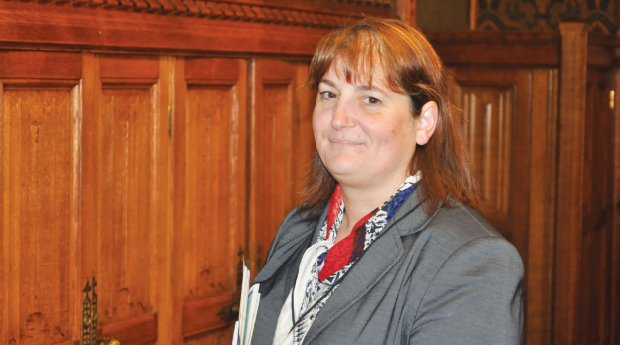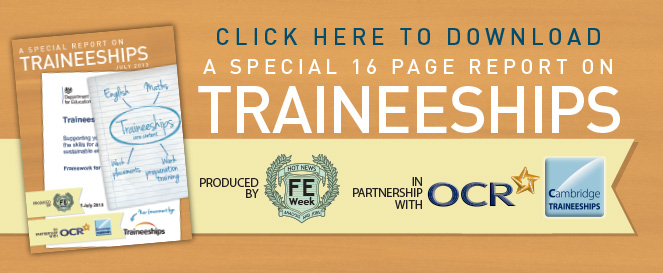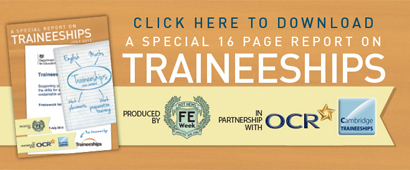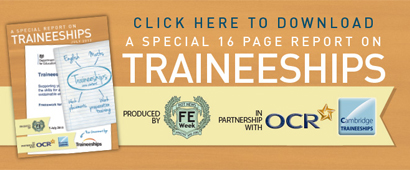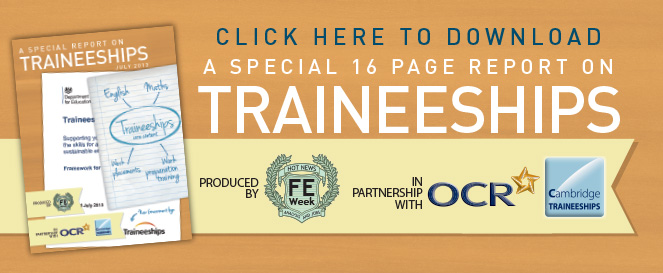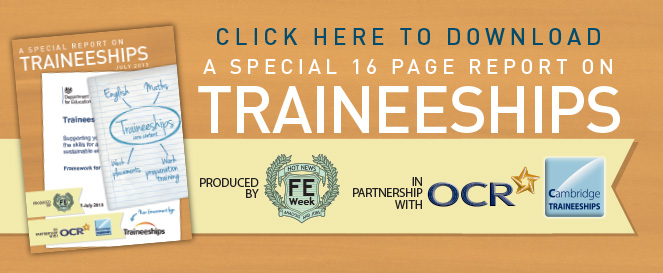With just four weeks to go until funding for traineeships begins, providers gathered at the Houses of Parliament to share their experiences of preparing for the first cohort.
A panel including Shadow Skills Minister Gordon Marsden MP, OCR chief executive Mark Dawe and new Association of Employment and Learning Providers president Stewart Segal addressed questions about the flexibility of the traineeship framework.
They also looked at developing a relationship with employers and ensuring each learner had the right experience.
John Hyde, executive chair of HIT Training, and Karen Taylor, work-based training manager at Bedford College, were also on hand in the Parliament committee room, to give provider perspective.
Mr Marsden warned traineeships, “mustn’t be… a return to low quality” and to prevent this, he said, they “need to be underpinned by key principles of progression”.
“The skills young people pick up on them must be suitable to improve their job prospects and their ability to take on apprenticeships as opposed to merely offering employers subsidised work placements,” he said.
“That principle of progression, the journey from school to college, or college to work is a key one and that’s the perspective we should use to frame the application for traineeships.”
Gordon Marsden speaking on the panel
Mr Segal agreed, warning that traineeships should not be seen as being solely a pre-apprenticeship training programme.
“A lot of young people will get work that doesn’t have an apprenticeships association with it, and we have to be careful that this is preparation for work, not just preparation for apprenticeships,” he said.
“We mustn’t forget that this is a cultural shift and that we need to be out there convincing employers that young people are good to employ and the traineeship is the route to a no-risk opportunity to do that.”
For Mr Hyde, progression into employment was particularly important in the service industry, where he predicted around 40 per cent of new jobs between now and 2020 were likely to be created.
“Fifteen years ago we had over 6,000 16 to 18 apprentices on our hospitality programmes. We are struggling today to place 600,” he said, pointing to an influx of trained labour from other parts of the EU.
“I think the traineeship programme could be the opportunity to get over that because it takes the risk from the employer of taking somebody on.”
At Bedford College, the employer response to traineeships had been “mixed”, according to Ms Taylor.
“We’ve got some who are going to be quite happy to provide placements, then we’ve got some who feel they’re a little unsure at the moment,” she said, although she added she was optimistic that those who could provide placements would eventually do so.
We need to be out there convincing employers that young people are good to employ and the traineeship is the route to do that”
Like many of the speakers, Ms Taylor stressed the importance of having a strong relationship with employers.
“Externally, it’s being promoted by our business development team — they’re actually in contact with employers each and every day, going out on visits, over the telephone, networking meetings and various events,” she said.
She added that the college would maintain contact with the employer and trainee throughout the programme, to address any “emerging issues” for each individual trainee.
“We do see it as being a very flexible programme and almost a bespoke programme for each trainee,” she said.
“We will do our best to meet their particular needs, so we do see that ongoing contact, that advice and guidance and emerging issues as being very important.”
The college began asking potential learners to register interest shortly after traineeships were announced, said Ms Taylor, so for colleges the immediate step would be to begin interviewing and testing those who wanted to be involved.
Mr Dawe said issues of flexibility and tailoring had been paramount in designing OCR’s offering of small, “pick-and-mix-style” units, enabling the provider and the learner to create a programme suited to their level and needs.
“Traineeships need to be focussed on the learner so there needs to be some flexibility for the individual learning for the trainee — you’re going to get different individuals coming in with different needs, so this is going to have to be a flexible programme as well,” he said.
Like Mrs Taylor, Mr Dawe argued classroom learning needed to support trainees’ development on placement, in order for the programme to be successful.
“It’s about the whole experience of the individual, it’s not just about qualifications,” he said.
The employer’s point of view
Amanda Charlton, head of workforce development at 1610 charitable leisure trust, which runs 20 sports and activity centres across South West England, emphasised the importance of provider and employer communication.
How did you find out about traineeships?
I’ve got an FE background, but we haven’t had a single call from a training provider about them.
We’ve written an employer ownership of skills (EOS) bid around traineeships along with two providers, but there’s another seven or eight other around us and we haven’t heard a peep out of them. That’s disappointing, because we were expecting people to be hammering on our door.
We’ve got 32 apprentices. We see them as an investment, and fundamental to our future growth… and 85 per cent of our apprentices stay on with us.
If we don’t get our EOS bid and this isn’t being promoted, where are our future employees going to come from? That is the concern for us.
Do you think the government should be promoting traineeships?
Absolutely. I haven’t found anything on any of our nearest training providers websites about traineeships, so even if employers do get to hear about traineeships, where are they going to get additional information?
What would you like to see done?
I think training providers have to be much more able to engage employers.
Some colleges and training providers are absolutely superb, but I think an awful lot more could be done with the vast majority of training providers.
Lots of training providers talk about employer engagement, but that’s just sending a leaflet out or making the odd call. Without proper engagement, traineeships will fail.
But actually what’s going to make traineeships work won’t necessarily be the English and maths; it will be the work placement.
That’s what will get young people engaged.


